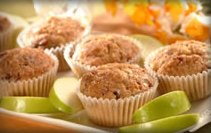 A new study shows that remaining on a diet and maintaining weight loss may have more to do with our brain waves than the growling in our tummy! Here's what you need to know .
A new study shows that remaining on a diet and maintaining weight loss may have more to do with our brain waves than the growling in our tummy! Here's what you need to know .
By Colette Bouchez
Have you ever struggled to lose weight ...only to gain it back again, sometimes even adding extra pounds?
If you've been blaming your downfall on a lack of will power , give yourself a break! Some new research suggests it just might be your brain waves sabotaging your skinny-jeans plan!
Indeed, new research, just published in the American Journal of Clinical Nutrition suggests that it could be a sort of “glitch” in the way our brain responds to not just the food we eat but the food we see that actually tempts us into going off the track of healthy eating and back to our old evil high-calorie ways!
“Our findings shed some light on the biological factors that may contribute to weight loss maintenance ….and [providing] an intriguing complement to previous behaviorial studies that suggest people who have maintained long term weight- loss monitor their food intake closely and exibit restraint in their food choices”, says lead author Jeanne McCaffrey of Miriam Hospital's Weight Control and Dibetes Center where the research was conducted.
Experts say the new findings suggest that the brains of people who successfully keep weight off may respond differently to outside eating cues – including the sight of food - than the brains of people who either can't maintain their weight loss, or are unable to even stay on a diet at all.
It is those brain responses, says McCaffrey, that appear to play a role in controlling our appetite and our desire to eat. More importantly, they can also become the source of the “impulse” that leads us to over eat - and the trigger that can make it so difficult for many people to maintain their weight loss, even after they achieve their goals.
Indeed, studies show that while those of us brave enough to tackle a weight loss diet frequently lose up to 10 percent of our body weight within 6 months, only two-thirds of us maintain that loss after a year. Morever, in 5 years, most of us return to our original weight – and sometimes more.
How The Study Was Done
The research involved 51 people, divided into three groups. The first group of 16 were obese and unable to successful control their weight; the second group of 17 had maintained a weight loss of 30 pounds or more for a minimum of three years; the final group of 18 were of normal weight and had no problems maintaining that weight.
To conduct the study, members of each group were shown images of various types of food – including low calorie “healthy” meals such as whole grain cereal fruits and vegetables, as well as high calorie foods such as cheeseburgers, desserts, and french fries. Acting as a control, the three groups were also shown images of non-food items such as bricks, plants and flowers.
After exposure to the various images, the researchers used an MRI to measure brain responses of each member of each group.
The result: When viewing the food photos, the brain wave activity in those who either had no weight problem, or who had maintained their weight loss was markedly different than in those unsuccessful dieters who remained obese. This, they researchers suggests that how our brain responds when we we view food may play a role in not only our food choices, but in how hard or easy it is to change our eating habits.
“It is possible that brain responses may lead to preventive or corrective behaviors – particularly greater regulation of eating”, says McCaffrey.
Indeed, experts say that when it comes to controlling our appetite, the mind may be even more influential than that growling tummy!
What the reseaerch didn't tell us : Whether or not these brain waves can be changed and if so – how we can go about changing them. That said, an editorial that accompanied the article suggests they can be changed, suggesting that the new research can lead to the development of more useful behaviorial therapies to help change our mental attitude towards food.
In the meantime, taking just a moment to stop and think before you eat could be all you need to interrupt that decision to take a bite ...or walk away!
You may also be interested in reading:
Sweet Fiber Curbs Appetite Boosts Weight Loss
Eat This and Burn More Fat!
Or visit RedDressDiary.com - THE SOURCE for health & beauty over 40!
Copyright by Colette Bouchez 2009 - All Rights Reserved.
In addition to US Copyright, the text of this RedDressDiary article is licensed under a Creative Commons Attribution-ShareAlike 3.0 License. All formatting and style elements of this page are not available under this license, and Colette Bouchez retains all rights in those elements.
Wednesday, September 23, 2009
When What You See IS NOT What You Eat!
Tuesday, September 8, 2009
Popcorn & Cereal As Good As Veggies for Improving Health!
 New research shows that certain cereals and many snack foods may offer as much nutrient protection against disease as fruits and veggies. Here's what you need to know!
New research shows that certain cereals and many snack foods may offer as much nutrient protection against disease as fruits and veggies. Here's what you need to know!
By Colette Bouchez
If you'd like to give an antioxidant boost to your health , but just can't seem to get enough fruits and veggies into your diet, try tossing down a few handfuls of popcorn or some Cheerios – or any whole grain cereal or snack cracker.
The reason? A brand new study shows these foods contain as much or more of the antioxidant protection we get from fruits and veggies!
“We found that, in fact, whole grain products have comparable antioxidants per gram to fruits and vegetables,” said lead researcher Joe Vinson, a chemist at the University of Scranton in Pennsylvania, where the research was conducted. Vinson presented his findings at recent meeting of the American Chemical Society.
Indeed, researchers have long known that foods like whole grain cereals and crackers, and even popcorn appeared to have positive health effects – but the general belief was that benefits were linked to their high fiber content. And while that fiber content is still important, the new research adds yet another dimension to their health benefits : Many of these foods contain high levels of polyphenols, the same natural chemical now believed to protect against a variety of diseases, including heart disease and some forms of cancer.
“Early researchers thought the fiber was the active ingredient for these benefits in whole grains, but recently, polyphenols emerged as potentially more important,” Vison recently told NutraIngredients-USA.
The grains that ranked highest in polyphenol content were oats, followed by corn in second place, and wheat placing third on the list.
How Whole Grains Protect You
Polyphenols are a group of compounds that fall under the heading of “antioxidants”. These are molecules that help protect the body from cell damage.
That damage occurs in a variety of ways - including exposure to cigarette smoke, air pollution, the damaging rays of the sun , or even via various forms of inflammation that result from a poor diet. If left unchecked, this damage eventually changes the DNA inside our cells - setting the stage for a variety of ailments to take hold, including cancer and heart disease.
But studies show you can do something about it. Indeed, by increasing your intake of foods rich in antioxidants – and particularly polyphenols - it's possible to counter some of that cell damage, or in some instances even prevent it from happening altogether.
While previous research indicated the best sources of polyphenols were red or purple fruits such as grapes, raspberries and strawberries, as well as walnuts, peanuts, green tea, red wine wine and chocolate, the new study shows you can now add whole grains to the list of foods that will protect you.
The Healthiest Snack Foods
In addition to testing the antioxidant content of the whole grains found in cereals and whole grain crackers the University of Scranton scientists also looked at the nutrient content of various snack foods – and again found some surprising results.
In general, snack foods made with whole grains had slightly lower levels of polyphenols than the whole grain cereals - but they still fared incredibly well. Moreover, one snack food seemed to “pop out” from the rest in terms of health benefits - and that was popcorn! It's antioxidant content was up to five times greater that of other whole grain snack foods even those made with corn.
In fact, when when compared to popcorn, all corn tortilla chips registered polyphenol levels ten times lower! Experts theorize the cooking and baking processes involved in preparing certain snack foods may reduce some of their nutrient value. By comparison, the cooking/baking process involved in making cereals and popcorn did not appear to reduce the nutrient protection of these foods.
What This Means To You Certainly don't stop eating fruits and veggies! In addition to polyphenols they contain lots of other phytonutrients that, at least right now, we can't seem to get from whole grain products.
Certainly don't stop eating fruits and veggies! In addition to polyphenols they contain lots of other phytonutrients that, at least right now, we can't seem to get from whole grain products.
At the same time you may be able to multiply the benefits of the fruits and veggies you do eat by adding in at least one serving per day of a whole grain oat, corn or wheat cereal.
Replacing snack crackers with popcorn can also improve your nutrient profile, and if you must eat crackers, the more whole grains they contain, they healthier they will be!
Colette Bouchez is the co-author of the new book "The New Fertility Diet Guide - Smart, Easy, Healthy Foods To Help You Get Pregnant Fast!
For more health and beauty tips for women visit www.RedDressDiary.com - The Source!
Copyright by Colette Bouchez 2009 - All Rights Reserved.
In addition to US Copyright, the text of this RedDressDiary article is licensed under a Creative Commons Attribution-ShareAlike 3.0 License. All formatting and style elements of this page are not available under this license, and Colette Bouchez retains all rights in those elements.



































